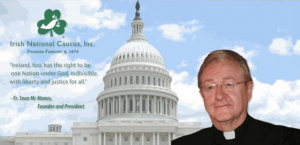Donaldson’s lack of regret could doom his leadership
Posted By: April 07, 2022

IRISH CONGRESSIONAL BRIEFING
Distributed to Congress by Irish National Caucus
Donaldson’s lack of regret could doom his leadership
DUP leader Sir Jeffrey Donaldson earned ridicule after blaming others for the party’s Brexit mess.
Newton Emerson. Irish News. Belfast. Thursday, April 7, 2022.
Sorry is the hardest word in politics but it is clear the public expects some show of contrition from the DUP over its Brexit mess.
Defiantly insisting it is beyond reproach and pointing at everyone else is no longer just implausible – it has become laughable.
Grilled by the Belfast Telegraph at the DUP’s election launch, Sir Jeffrey Donaldson repeatedly declined to apologize for anything his party has done in recent years.
Instead, he blamed the protocol on Theresa May and Boris Johnson, despite the DUP keeping May in office then helping Johnson to succeed her. This earned Sir Jeffrey front-page ridicule the following day.
The splitting of the DUP’s support to the UUP, Alliance, and the TUV shows it is not only liberal remainers who find its excuses ridiculous. The whole of Unionism feels owed an explanation, at least.
An unscripted apology at an election launch would be a brave move for any political leader. A unionist might get away with quoting the Queen from her 2011 visit to Dublin: “with the benefit of historical hindsight we can all see things which we wish had been done differently, or not at all.”
Brexit is not history, however, and Sir Jeffrey has long been involved in it.
Most parties that had painted themselves into as many corners as the DUP would begin extricating themselves by replacing their leader. The DUP is no exception – counting the brief reign of Edwin Poots, it has changed leaders twice.
Unfortunately, its new leader is more rather than less implicated in the party’s Brexit disaster, thanks to the talent shortage that saw Stormont-based Arlene Foster replaced with Westminster-based Sir Jeffrey.
Nigel Dodds, the DUP’s former deputy leader and leader in the Commons, was the party’s true driving force on Brexit, from the beginning of the Leave campaign until the loss of his north Belfast seat in 2019. He is now safely parked in the House of Lords.
Sir Jeffrey could excuse himself as merely an errand boy, taking donations and placing newspaper ads for what the DUP largely considered a harmless hobby: a spot of recreational British nationalism around a hopeless referendum to keep its irrelevant MPs occupied, while the serious politics took place at Stormont. Although this would have the advantage of being substantially true, could Sir Jeffrey admit it? It is hardly to his credit.
Going into opposition is the other way a party in so many predicaments would normally begin to recover. Intriguingly, Sir Jeffrey referred to this in January as “an option” after May, even if the DUP remains the largest unionist party. There is momentum for a change in the rules that would permit this: Alliance is campaigning to reform mandatory coalition and the latest Irish News/University of Liverpool opinion poll shows such reforms would have strong public support.
The poll also shows the public wants Stormont to return after the election. If the DUP crashes devolution or stalls it for months of face-saving negotiations, it will just make itself more unpopular.
So even a party as single-mindedly focused on power as the DUP might see the logic in taking a break from office while letting everyone else carry on without it.
Sir Jeffrey might see the logic in a personal equivalent: returning to Westminster and letting the DUP carry on at Stormont without him.
When an MP wins an assembly seat they have eight days to decide which one to keep. If they give up the assembly seat, their party can co-opt someone else into it.
Last month, under persistent questioning from Stephen Nolan, Sir Jeffrey refused to rule this out.
But retreating back to Westminster would not be about humility. It would be saying a DUP leader is too important to hang around Stormont waiting for devolution to be restored, especially if that would mean serving ‘under’ Sinn Féin.
Even unionist voters who do not want the DUP to facilitate a republican first minister could find the aloofness of this tactic unappealing. Many might feel abandoned.
How much more straightforward it would be, certainly after the election, to just express a degree of regret.
The flip side of unionism’s prickly pride is respect for those who seek forgiveness and are born again. Peter Robinson and the late Ian Paisley only had to obliquely address their mistakes to transform their reputations. Foster’s inability to do so doomed her leadership.
Donaldson is a far better communicator, yet in so much worse a position, he is in danger of the same fate.










